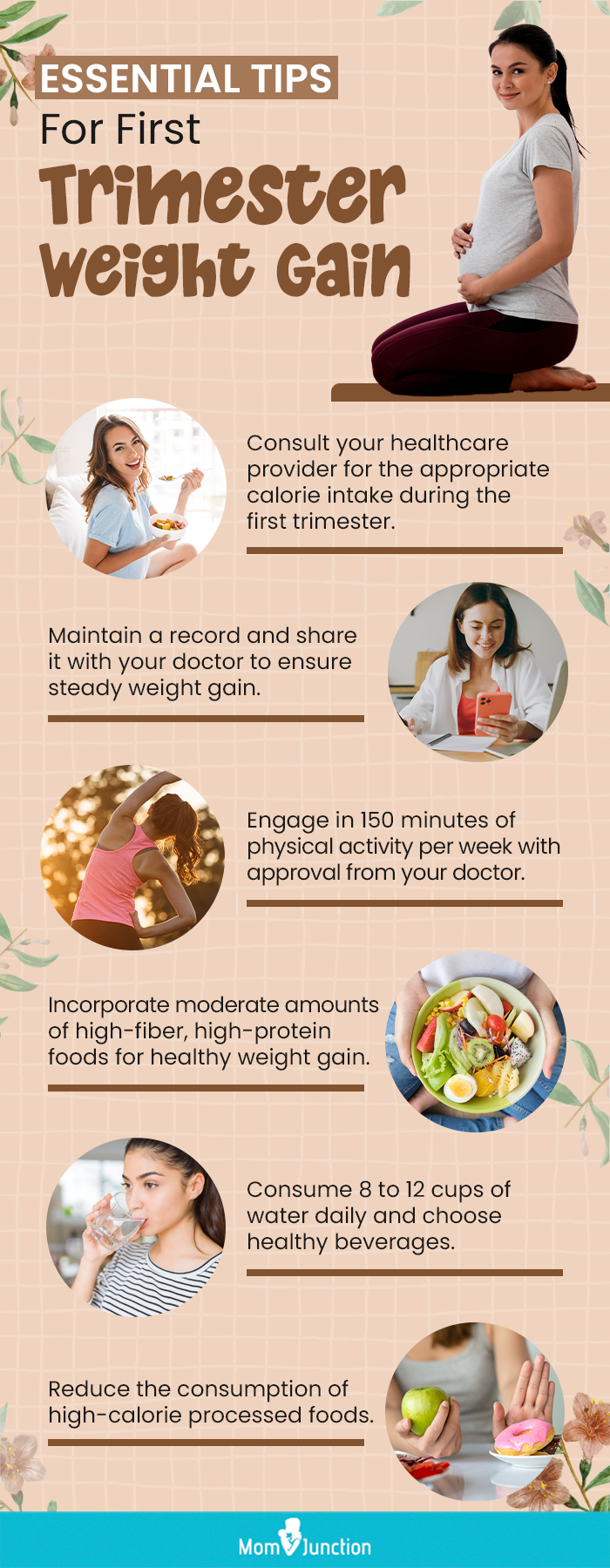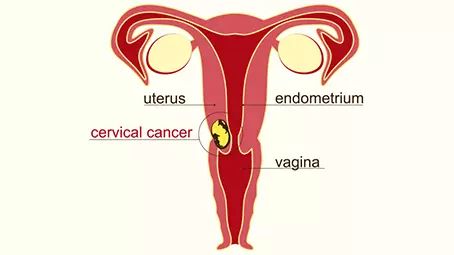
Image: Shutterstock
The first 12 weeks of gestation, starting from conception, is called the first trimester. During this period, the body begins to expand and grow, along with other physiological and physical changes in the mother and the baby, leading to weight gain in the first trimester. However, weight gain may not be common for all women. Some may also lose weight during this period due to common pregnancy problems, such as loss of appetite and morning sickness (1). Hence, awareness and knowledge about the correct and healthy weight during the first trimester can help prevent weight-related complications later in pregnancy.
Read on to know about tips for healthy weight gain in the first trimester.
Key Pointers
- A weight gain of one to 4.5 pounds in the first trimester is healthy for women with normal BMI.
- Gaining a lot more weight than average can expose you and your baby to health risks such as macrosomia.
- Watching your calorie intake, monitoring your weight, eating a well-balanced diet, and indulging in mild physical activity can help you gain a healthy weight.
How Much Weight Should You Gain In The First Trimester?

Women with normal weight or BMI before pregnancy are expected to gain 1 to 4.5 pounds (0.5 to 2kg) of weight in the first trimester (2). If they are expecting twins, their expected weight gain rises to 4 to 6 pounds (1.8 to 2.7kg) (3).This weight gain target further increases for those expecting multiples. If you are overweight or obese, your weight recommendation will be different. In such cases, rather than gaining weight, your doctor will advise you to maintain your pre-pregnancy weight.
Should You Worry About Not Gaining Weight In The First Trimester?
Weight gain during pregnancy is common, but it doesn’t happen for every woman at the same pace and pattern. For those suffering from morning sickness, nausea, and food aversions due to hormonal changes in pregnancy, losing weight (or not gaining much weight) in the first trimester isn’t uncommon (4). However, losing too much weight may indicate an underlying concern, such as hyperemesis gravidarum, a condition that causes severe and persistent nausea and vomiting (5).

Nonetheless, appetite changes due to fluctuating pregnancy hormones in the first trimester are common and are unlikely to affect your and your baby’s health. Yet, it’s important to inform the doctor about the weight changes and the symptoms you are experiencing. This way, they can decide and provide resources to provide nutritional support if needed.
Most women regain their appetite by the start of the second trimester and even develop food cravings, making them eat more than they were in the first trimester. These changes, along with several other changes, such as water retention, bloating, and changes in the body metabolism make the mother gain weight in the second and third trimesters.
How Much Weight Gain Is Too Much?

Just like less or no weight gain, there will be mothers who may gain more weight than expected. While a little weight gain over what’s expected will not harm you and your fetus, excessive weight gain will certainly raise the chances of adverse health risks in the advanced stages of pregnancy. Thus, you should watch your weight gain and keep it within your target weight limits. If you see you are gaining too much weight too quickly, talk to your doctor.
According to the California Department of Public Health, 42% of pregnant women gain weight during pregnancy that exceeds the recommended amount, while 35% gain weight within the recommended range.
As the graph below illustrates, a woman’s pre-pregnancy weight status determines her weight gain during pregnancy. For instance, of those underweight before pregnancy, 45% gained the recommended weight. In contrast, among those who were overweight before pregnancy, 31% gained appropriate weight, whereas, among those obese, 27% gained recommended weight.

Weight gain during pregnancy in relation to pre-pregnancy weight status (BMI)
Source: Healthy weight for healthy birth and beyond; California Department of Public HealthWhat Are The Risks Of Gaining Too Much Weight?
Gaining too much weight in the first trimester doesn’t affect your and your baby’s health immediately. However, when the extra weight gain continues throughout the pregnancy, it can cause fatigue and will expose you and your baby to health risks, such as (2) (6)
- Macrosomia: Excess gestational weight gain from the start of pregnancy can cause the baby to gain excess weight. When a baby weighs 8 pounds and 13 ounces (4kg) at the time of delivery, it’s known as macrosomia, and the baby is considered large for its age.
- Birthing difficulties: When a baby is large for its gestational age, there’s a risk of birthing difficulties, such as shoulder dystociaiA vaginal delivery complication in which the baby’s shoulder gets stuck above the mother’s pubic bone. and prolonged labor. It’s the reason that a mother with a large baby may be advised to have a cesarean section (c-section) for childbirth.
- Gestational diabetes: Gaining too much weight early in the pregnancy can cause insulin insensitivityiA condition in which the body cells do not respond well to insulin and are unable to take up glucose from the blood. , which, coupled with continued weight gain, raises a mother’s risk of developing gestational diabetes. Gestational diabetes causes high blood sugar levels, which can cause the baby to gain too much weight.

Since excess maternal weight gain is linked to several health risks for the mother and the baby, it’s pertinent that you follow the right dietary practices and keep your weight gain steady and gradual.
 Quick fact
Quick factTips To Gain Healthy Weight In The First Trimester
Eating a calorie-balanced diet right from the first trimester helps keep your weight gain steady and gradual throughout the pregnancy. Here are some helpful tips to follow (7).
- Know your calorie intake: According to the Academy Of Nutrition And Dietetics, pregnant women don’t need to consume extra calories in the first trimester (8). It’s because the baby is still too small, and so are its nutritional needs. Hence, talk to your healthcare provider for the information on calories you should consume in a day relative to your weight or BMI category.
- Monitor your weight: Maintain your weight record and share it with your healthcare provider during your prenatal care check-ups. Doing so will help your doctor monitor your weight gain and keep it steady and gradual. For instance, if you aren’t gaining much weight, they may ask you to raise your calorie intake. On the contrary, they may order some tests to rule out any underlying issues if you are gaining too much weight too quickly.
- Stay active: Physical activity is vital across life stages, including pregnancy. It will help you keep your weight gain in control and also stay flexible and strong. Hence, aim at indulging in 150 minutes of physical activity every week. For that, spend 30 minutes a day, at least five days a week, doing different activities, such as walking, yoga, cycling, and swimming. Remember to consult your doctor to get an idea of suitable exercises in first trimester.

- Eat a well-balanced diet: A well-balanced, healthy diet ensures you gain healthy weight and your baby gets all the vital nutrients it needs for growth and development. So, include various high-fiber, high-protein foods, such as whole grains, seeds, nuts, lean meat, fresh fruits, vegetables, and low-fat dairy, in your diet and consume them in moderation. Also, instead of eating three large meals, eat three small meals a day with two snacks to beat hunger pangs.
- Maintain hydration: American College of Obstetricians and Gynecologists advise drinking 8 to 12 cups of water a day during pregnancy (9). You can meet your water needs by drinking plain water and consuming other healthy beverages or fluids, such as soup, tender coconut water, buttermilk, and low-sugar lemonade. Consuming these drinks will help you avoid unhealthy drinks, such as coffee, soft drinks, and energy drinks.
- Avoid or limit processed food intake: Processed foods, such as biscuits, cookies, chips, and ready-to-eat meals, are high in calories that mainly come from saturated fat and refined sugar. Since high amounts of sugar and fat can cause excess weight gain, it’s good to avoid or limit their intake.
 Quick tip
Quick tipBesides these, stay stress-free and sleep sound for at least eight hours daily. When followed diligently, these healthy practices can help you gain and maintain weight within target weight gain limits. In addition, the controlled weight can eventually reduce pregnancy complications and support labor preparation and postpartum recovery.
Frequently Asked Questions
1. Is 10 pounds a lot to gain in the first trimester?
On average, most women gain about two to four pounds during the first trimester. But this range can vary from one woman to another depending on their body type and pre-pregnancy weight. Therefore, it is not unnatural to gain 10 pounds during your first trimester. However, discussing it with your doctor will help manage the situation in an ideal manner.
2. Can I try to lose weight during the first trimester?
Even though gaining weight during pregnancy may lead to self-image concerns and impact self-esteem, experts advise against losing weight when pregnant. It is because losing weight during pregnancy may inadvertently jeopardize the baby’s access to necessary nutrients, potentially impacting their healthy growth and development (10). If you are worried about weight gain during pregnancy, talk to your partner, family, or friends for support and guidance.
3. Can medication or supplements affect weight gain in the first trimester?
According to a study, the uncontrolled use of multivitamins and supplements can lead to excess weight gain and even obesity in extreme cases. To ensure that you are consuming a balanced diet and necessary supplements, consult your healthcare provider and follow a diet chart that has been personalized to suit your requirements (12) (13).
Each woman’s weight gain in the first trimester may vary. Hence, consult your doctor and dietician to know your ideal weight gain during pregnancy. If you were overweight or obese before pregnancy, do not attempt to lose weight unless a doctor has advised you. Alternatively, if you have been advised to gain weight, consume a balanced diet to do so, and avoid empty calories and processed foods. If you suspect you haven’t gained the ideal weight, speak to your doctor. Similarly, you may consult a doctor to get into shape even before conception.
Infographic: Points To Remember For First Trimester Weight Gain
The first trimester is pivotal for your and your baby’s progress. While numerous women face morning sickness and weight reduction, it’s vital to concentrate on attaining a healthy weight. This infographic offers valuable advice to nurture your body, foster your baby’s development, and sustain your overall wellness in the first trimester. Illustration: Momjunction Design Team
Illustration: Weight Gain in First Trimester: How Much Is Normal And Risks

Image: Dall·E/MomJunction Design Team
References
- Weight Gain During Pregnancy.
https://www.marchofdimes.org/find-support/topics/pregnancy/weight-gain-during-pregnancy - Healthy Eating for Two.
https://americanpregnancy.org/healthy-pregnancy/pregnancy-health-wellness/eating-for-two/ - Weight Gain With Twins.
https://americanpregnancy.org/healthy-pregnancy/multiples/weight-gain-with-multiples/ - Appetite changes and food aversions during pregnancy.
https://www.pregnancybirthbaby.org.au/appetite-changes-and-food-aversions-during-pregnancy - Pregnancy Complications.
https://www.cdc.gov/maternal-infant-health/pregnancy-complications/?CDC_AAref_Val=https://www.cdc.gov/reproductivehealth/maternalinfanthealth/pregnancy-complications.html - Weight Gain In Pregnancy.
https://www.pregnancybirthbaby.org.au/weight-gain-in-pregnancy - Tracking Your Weight for Women Who Begin a Twin Pregnancy At A Normal Weight.
https://www.cdc.gov/maternal-infant-health/media/pdfs/Normal_Weight_Tracker_508Tagged.pdf - Healthy Weight during Pregnancy.
https://www.eatright.org/health/pregnancy/prenatal-nutrition/healthy-weight-during-pregnancy - How much water should I drink during pregnancy?
https://www.acog.org/womens-health/experts-and-stories/ask-acog/how-much-water-should-i-drink-during-pregnancy - Being overweight during pregnancy.
https://www.marchofdimes.org/find-support/topics/pregnancy/being-overweight-during-pregnancy - Healthy Weight for Healthy Birth and Beyond.
https://www.cdph.ca.gov/Programs/CFH/DMCAH/NUPA/Pages/Healthy-Weight-for-Healthy-Birth-and-Beyond-Data-Brief.aspx - Nutrition During Pregnancy.
https://www.acog.org/womens-health/faqs/nutrition-during-pregnancy - Müberra Namli Kalem et al; (2017); Prenatal multivitamin supplementation increases birth weight.
https://www.ijrcog.org/index.php/ijrcog/article/view/2652
Community Experiences
Join the conversation and become a part of our nurturing community! Share your stories, experiences, and insights to connect with fellow parents.
Read full bio of Dr. Mona Hardas
Read full bio of Swati Patwal
Read full bio of Rebecca Malachi
Read full bio of Aneesha Amonz

















